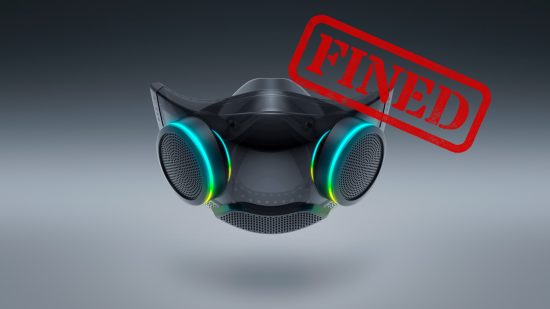Remember at the height of the Covid pandemic when there was a rush to get hold of face masks? Well, during that period, Razer announced it would make a new Razer face mask that would bring RGB to the world of personal pathogen protection, while offering N95 surgical mask-rated filtration. However, Project Hazel, as it was known, didn’t live up to the hype and now it’s costing Razer over $1 million.
Razer might be a maker of some of the best gaming mice, along with other peripherals, but these products don’t require medical-grade accreditation. As such, the problem with the Razer Zephyr, as the product was eventually called, was that it simply didn’t meet the National Institute for Occupational Safety and Health (NIOSH) rating for an N95 surgical mask.
That came to light quite quickly, and Razer downplayed this aspect of the product in response, but that wasn’t enough to satisfy the FTC, which has just handed the company a sizeable fine.
Specifically, Razer has been told to set aside $1.1 million in order to offer “full refunds to consumers nationwide,” and the FTC has also added a $100k civil penalty for good measure. Of course, in the grand scheme of things, these numbers are small fry for a company as large as Razer, whose revenue registers in the billions, but it will still make for a chapter the company will want to forget.
In summarizing the reasoning for coming down on Razer, despite the company quite quickly backpedaling on any specific medical claims, the FTC said, “[Razer] advertised the Zephyr on social media and the internet as an N95 mask that provides consumers with protection against contracting COVID19. However, the Zephyr has never been certified or otherwise approved as an N95 mask, and Defendants lacked competent and reliable scientific bases for their claims. Their use of deceptive advertising and misinformation posed a risk to public health and safety”
Razer CEO Min-Liang Tan also made several Facebook posts about the Zephyr mask, with one claiming that its filters “have been tested and certified for 99% BFE (bacterial filtration efficiency), the same standards for the most demanding medical grade masks out there.” However, such testing apparently never happened.
In response to the FTC’s summary, Razer released the following statement:
“We disagree with the FTC’s allegations and did not admit to any wrongdoing as part of the settlement. It was never our intention to mislead anyone, and we chose to settle this matter to avoid the distraction and disruption of litigation and continue our focus on creating great products for gamers. Razer cares deeply about our community and is always looking to deliver technology in new and relevant ways.
The Razer Zephyr was conceived to offer a different and innovative face covering option for the community. The FTC’s claims against Razer concerned limited portions of some of the statements relating to the Zephyr. More than two years ago, Razer proactively notified customers that the Zephyr was not a N95 mask, stopped sales, and refunded customers.”
All told, it’s safe to say the Zephyr wasn’t a successful venture for Razer. Not only did it seem like a silly idea in the first place, but it’s now cost the company even more money. It’s good, then, that there are still plenty of good Razer products to balance the books.
While they may lack any sort of face protection, we can vouch for the excellent gaming performance of the Razer Viper V3 HyperSpeed, as well as the Razer BlackShark V2 Pro, and the Razer Huntsman V2, all of which have places on our buying guides.
